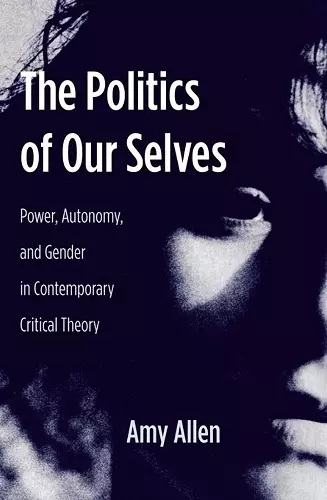The Politics of Our Selves
Power, Autonomy, and Gender in Contemporary Critical Theory
Format:Paperback
Publisher:Columbia University Press
Published:30th Jul '13
Currently unavailable, and unfortunately no date known when it will be back

Some theorists understand the self as constituted by power relations, while others insist upon the self's autonomous capacities for critical reflection and deliberate self-transformation. All too often, these understandings of the self are assumed to be incompatible. Amy Allen, however, argues that the capacity for autonomy is rooted in the very power relations that constitute the self. Her theoretical framework illuminates both aspects of what she calls, following Foucault, the "politics of our selves." It analyzes power in all its depth and complexity, including the complicated phenomenon of subjection, without giving up on the ideal of autonomy. Drawing on original and critical readings of a diverse group of theorists, Allen shows how the self can be both constituted by power and capable of an autonomous self-constitution.
Some critical theorists understand the self as constituted by power relations, while others insist upon the self's autonomous capacities for critical reflection and deliberate self-transformation. Up to now, it has all too often been assumed that these two understandings of the self are incompatible. In her bold new book, Amy Allen argues that the capacity for autonomy is rooted in the very power relations that constitute the self. Allen's theoretical framework illuminates both aspects of what she calls, following Foucault, the "politics of our selves." It analyzes power in all its depth and complexity, including the complicated phenomenon of subjection, without giving up on the ideal of autonomy. Drawing on original and critical readings of a diverse group of theorists, including Michel Foucault, Jurgen Habermas, Judith Butler, and Seyla Benhabib, Allen shows how the self can be both constituted by power and capable of an autonomous self-constitution. Her argument is a significant and vital contribution to feminist theory and to critical social theory, both of which have long grappled with the relationship between power and agency. If critical theory is to be truly critical, Allen argues, it will have to pay greater attention to the phenomenon of subjection, and will have to think through the challenges that the notion of subjection poses for the critical-theoretical conception of autonomy. In particular, Allen discusses in detail how the normative aspirations of Habermasian critical theory need to be recast in light of Foucault's and Butler's account of subjection. This book is original both in its attempt to think of power and autonomy simultaneously and in its effort to bring the work of Foucault and Habermas into a productive dialogue.
Scholars will find this book an interesting read. -- Kristina Grob Feminist Review Blog Persuasive and well-reasoned -- J. Jeremy Wisnewski Notre Dame Philosophical Reviews This admirable book provides incredibly clear and lucid readings of texts that students find notoriously difficult... Highly recommended. Choice Nuanced and careful readings of Foucault, Butler, Habermas and Benhabib. -- Margaret A. McLaren Foucault Studies A pathbreaking and elegantly argued book. -- Jana Sawicki PhiloSOPHIA "[A] tour de force... The Politics of Our Selves forces its reader to think hard, and honestly to think through the implications of the glib stand-off between Foucault and Habermas that stands in for a much more meaningful dialogue that we rarely get to have. -- Cressida Heyes Philosophy and Social Criticism A remarkably comprehensive and very impressive treatment of many of the most vexing issues in contemporary critical theory. -- Moira Gatens European Journal of Philosophy
ISBN: 9780231136235
Dimensions: unknown
Weight: unknown
248 pages